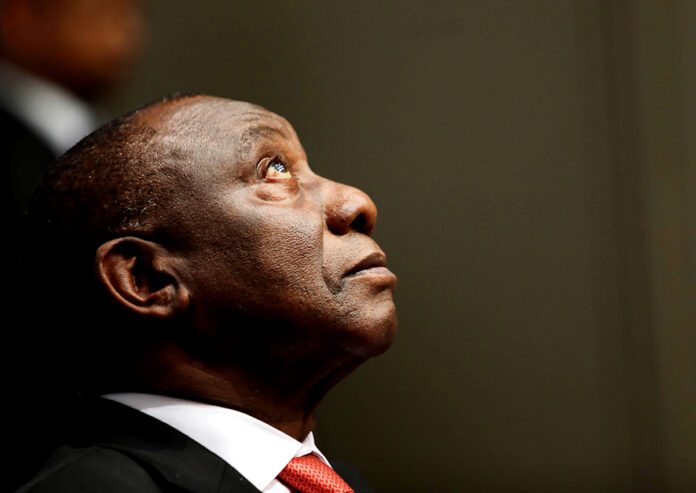President Cyril Ramaphosa‘s Phala Phala game farm in Limpopo did not actually conclude the sale of any buffaloes to Sudanese businessman Hazim Mustafa, so the legal requirement to declare foreign currency allegedly used as payment for the beasts does not apply.
This is according to the Reserve Bank’s investigation into Ramaphosa’s stolen illegal dollars that were allegedly hidden in a sofa instead of being lawfully declared to authorities.
The central bank said on Monday that the legal provision to declare was not triggered because a complete transaction had not been concluded.
Notably, the bank classified the full report and will not publish it.
The outcome effectively shifted any possible wrongdoing in the politically managed Phala Phala scandal squarely into the criminal realm, where it would be up to the Hawks to determine whether the law was broken.
Dubai-based businessman Hazim allegedly bought 20 buffaloes from Ramaphosa, who personally handpicked the animals.
But the entire transaction was a farce, legally speaking, since Hazim had, to date, not yet collected his lucrative goods.
The acting public protector’s report that also cleared Ramaphosa of wrongdoing assumed a legitimate transaction took place.
This means the Reserve Bank’s findings poke holes in the version of acting public protector Kholeka Gcaleka, who said it was outside her scope to test the transaction’s validity.
The bank’s finding also contradicts the SA Revenue Service report that a tax compliance statement issued indicated that the $4-million (R76-million) sale of the game in 2020 had been declared.
Notably, the revenue collector also found that the money was in the country illegally, since Hazim did not declare the funds at any port of entry into the country.
In a report dated August 21, the Reserve Bank said its probe cleared Ramaphosa based on the lack of evidence that the transaction was completed in the manner required by law.
As such, it determined that neither the entity nor Ramaphosa violated the regulation, said bank spokesperson Toshaya Panday.
“On the facts available to it, the SARB [SA Reserve Bank] finds that there was no perfected transaction, and thus the SARB cannot conclude that there was any contravention of the Exchange Control Regulations by Ntaba Nyoni Estates or, for that matter, by the president,” Panday said.
In terms of the relevant regulation (6)(1), every person resident in the republic who becomes entitled to sell or to procure the sale of any foreign currency shall, within 30 days after becoming so entitled, make or cause to be made, a declaration in writing of such foreign currency to the Treasury or to an authorized dealer.
“The governor will provide feedback within the applicable legal constraints to parliament during the SARB’s upcoming engagement with parliament,” Panday said.
In December 2022, the ANC used its majority in parliament to shield Ramaphosa from accountability, saying that a finding of an independent panel led by retired chief justice Sandile Ngcobo was legally flawed and had to be confirmed by the court.
A panel led by Ngcobo also questioned the legitimacy of Hazim’s transaction, suggesting that the story may have been a desperate cover-up.
The absence of a valid and verifiable transaction would trigger suspicions of money-laundering.
Ironically, Ramaphosa has decided that he will no longer take the findings of the independent panel on review after the Constitutional Court dismissed his application for direct access, saying that the matter should first be ventilated in the lower courts.
Among the questions left for the Hawks is whether Ramaphosa had permission from the Treasury to trade in foreign currency or whether the game farm business had applied for that exception as part of the tourism industry.
For that to be proven, a written record of formal approval from the Treasury would have to be produced.
Follow @SundayWorldZA on Twitter and @sundayworldza on Instagram, or like our Facebook Page, Sunday World, by clicking here for the latest breaking news in South Africa.



